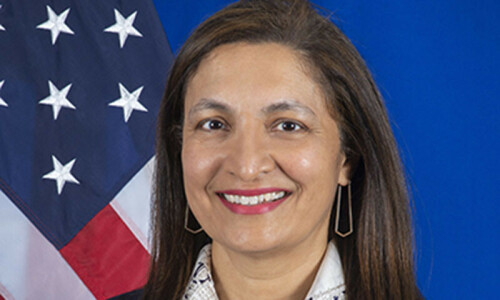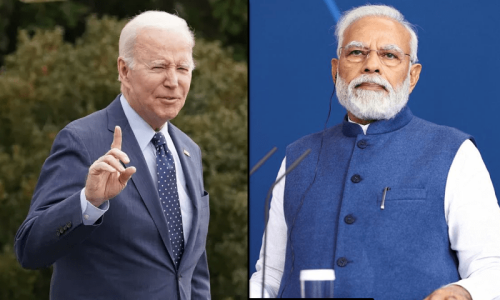UZRA Zeya is President Joe Biden’s human rights point person. Her July 8-14 visit to Bangladesh and India is being seen as important to Biden’s interest in sprucing up his country’s image on human rights and democracy at home and abroad.
The image was dented recently, not for the first time though, when Biden humoured India’s Prime Minister Narendra Modi with the red-carpet treatment. Why then did Washington place Modi on its human rights watch earlier and denied him a visa when he was chief minister of Gujarat? What has changed since? Most of us perhaps know the answer, but Zeya might consider clarifying for her own credibility, as to what forced Biden to make the ideological flip.
We may know the answer to that too. Strategic interests have usually upstaged America’s self-assigned role as the standard bearer of human rights. In this field, the reviled Donald Trump was at least more honest, even if criminally brazen.
He matter-of-factly cited $100 billion worth of arms sales to Saudi Arabia to justify his embrace of the alleged killer of journalist Jamal Khashoggi.
Biden — hypocritically, as it turned out — vented his spleen at the Saudi prince during the presidential races before hugging him after becoming president. To his chagrin, it was China that had the last laugh, when Beijing performed the impossible political calisthenics to bring Saudi Arabia and Iran together, while the US gaped.
The dubious US signal concerning human rights abuse in India under Modi’s watch becomes sharply focused, therefore, as at least 75 US Congressmen expressed their concern to Biden at the cordiality with which he received the Indian PM. It seems gratuitous to ponder whether Biden needs any leverage with Modi at all when his Indian mate is being groomed as an important asset in America’s current China policy.
Pity that Biden was not in a position to follow Barack Obama’s handy advice about speaking plainly to Modi. There’s no evidence of any focused discussion, apart from a vacuous press conference, where the question on human rights posed to Modi should have been asked of Biden.
Zeya’s forbears came from Bihar in India, the state where pro-Modi thugs set fire to a fabled library to spite the Muslim legacy of Bihar Sharif. That they carried out the outrage on the sacred Hindu holiday of Ram Navami bears testimony to the real agenda behind the religious upsurge that Modi rides.
The Azizia Library had around 4,500 books on Islamic literature and divinity stored for over 100 years. Most of the books and manuscripts have been destroyed. But isn’t that what US soldiers were accused of doing in Iraq, watching the destruction of its ancient Babylonian heritage?
Pity that Biden was not in a position to follow Obama’s handy advice about speaking plainly to Modi.
Zeya would be helped in her tricky mission by the US ambassador himself, a former member of the board of Human Rights Watch.
During his testimony to the Senate in December 2021, Eric Garcetti stressed that “human rights and strong democratic institutions are key elements of our strategic partnership and values enshrined in our constitutions, and if confirmed, I will engage closely and regularly with the Indian government on these issues”.
He said that he would bring up human rights and discrimination enshrined in a controversial citizenship law as a ‘core’ part of his engagement, rather than a mere obligation. “There are groups that are actively fighting for human rights of people on the ground in India that will get direct engagement from me.”
Zeya would do well to dig up evidence during her visit to verify if Modi had moved away from the kind of sectarian politics that got him censured by Washington and much of Europe not long ago.
Zeya could benefit from listening to victims of abuse and those being hounded for working as human rights defenders. Is she meeting Teesta Setalvad, the courageous woman activist who is mercilessly trolled by Modi sympathisers, and who was jailed after the Supreme Court reprimanded her for defending victims of the 2002 communal frenzy in Gujarat?
Teesta continues to be shadowed by the state’s agencies for standing her ground on behalf of the men and women targeted in Gujarat. Is Zeya’s meeting lined up with critics of state-sponsored bigotry, for example the Amnesty’s Aakar Patel?
His office was shut down by an opaque government fiat. There’s the harassed gamut of journalists, stand-up comedians, the violently assaulted men and women from Manipur, Kashmir, terrified representatives of Muslim, Christian and Dalit groups. Zeya was expected to discuss the plight of Rohingya refugees in her Bangladesh lap, but the Rohingya face a greater ordeal in India, not least for belonging to a targeted religion.
Human rights is something most countries want to see being practised by others. One can recall occasions when the Indian spokesperson would cite Amnesty International to censure ethnic violence in Karachi, and Pakistan would use the same agency to target India on the abuse of Kashmiris. But when it came to their own censure by the agency, they saw a foreign hand in the criticism.
Pakistan’s Prime Minister Shehbaz Sharif was on a video conference with leaders of the Shanghai Cooperation Council, recently hosted by the Indian prime minister. Sharif used the occasion to accuse the Indian government, without naming it, of targeting the minorities.
The point was well taken, but it would have been more credible had Mr Sharif paid attention to the sorry state of his own ethnic minorities as recorded by human rights groups in his country. Pakistan’s double standards on human rights were evident from the fact that it helped crush the aspirations of Sri Lanka’s Tamil minority by arming the Sinhalese army.
It wants those stolen rights to be given to Kashmiris living in terror of the Indian state and its military. Of course, the less said the better about the West’s hypocrisies. When Russia was accused of using cluster weapons in Ukraine, they called it war crime. And now?
The writer is Dawn’s correspondent in Delhi.
Published in Dawn, July 11th, 2023















































Dear visitor, the comments section is undergoing an overhaul and will return soon.